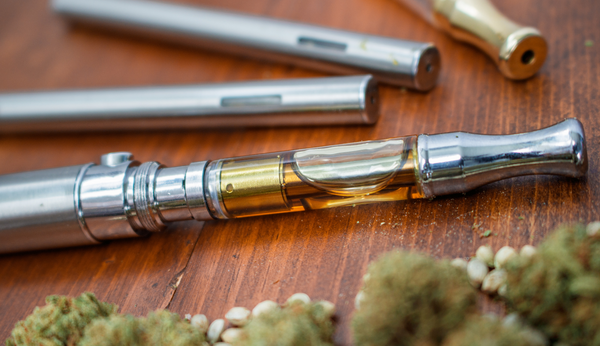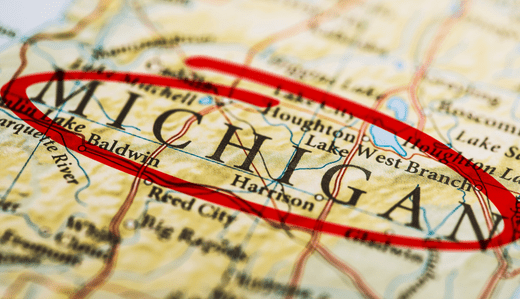Your Cart is Empty
FREE SHIPPING ON ALL ORDERS $75+
Delta-8-THC is legal by federal law, but is Delta-8-THC legal in Michigan?
Every state governs hemp differently, but Michigan’s Delta-8 laws may be some of the most confusing in the nation.
The state has moved to regulate Delta-8 products in the state, which means that they are legal, but there may be some accessibility issues.
Here's what we know:
Looking for federally legal Delta-8-THC? Check out our Elev8 Collection.
Disclaimer: We’re always working to stay informed on the latest Delta-8 laws and research. However, state laws are subject to change and we advise that you do your own research to verify the information you find in this article. This is not intended as legal advice.
Michigan Delta 8 Laws Table of Contents
Michigan Delta-8-THC Laws
Delta-8-THC Possession Limits in Michigan
Is Delta-9-THC Legal in Michigan?
Where to Buy Delta-8 in Michigan
Do You Have to Be 21 to Buy Delta-8?
Is Delta-8 Legal in All 50 States?
Resources
Michigan updated its hemp laws after the 2018 Farm Bill took effect to effectively legalize most hemp derivatives, like CBD.
The new laws define hemp similarly to the way they are defined by federal law. In Michigan, hemp means the plant Cannabis sativa and all parts of the plant, including cannabinoids, isomers, acids, salts, and salts of isomers. By this definition, Delta-8-THC appears to be legal in the state.
However, the state’s Controlled Substances Act lists delta-9-tetrahydrocannabinol and all of its optical isomers as a Controlled Substance, which seems to include Delta-8-THC. Under these conflicting laws, Delta-8 appears to be legal when naturally derived from legal hemp material, but not when produced via isomerization.
To clarify, Governor Whitmer signed a law with intent to regulate the manufacture and sale of Delta-8 material in the state. It's unclear whether the new law specifies whether Delta-8-THC can be made from hemp material or not, but it does require all manufacturers and sellers to be licensed through the Michigan Marijuana Regulatory Agency. This effectively regulates Delta-8 as a marijuana product, not a hemp product.
In other words, Delta-8 is legal, but it may need to be purchased through a state-licensed dispensary.
In neighboring states Indiana and Ohio, Delta-8 is legal without these harsh restrictions.
Here are some excerpts from Michigan state law:
EFFECTIVE DATE: January 15, 2019
(i) “Industrial hemp” means the plant Cannabis sativa L. and any part of that plant, including the viable seeds of that plant and all derivatives, extracts, cannabinoids, isomers, acids, salts, and salts of isomers, whether growing or not, with a delta-9-tetrahydrocannabinol concentration of not more than 0.3% on a dry weight basis. Industrial hemp includes industrial hemp commodities and products and topical or ingestible animal and consumer products derived from the plant Cannabis sativa L. with a delta-9-tetrahydrocannabinol concentration of not more than 0.3% on a dry weight basis.
(v) “THC” means tetrahydrocannabinol.
(2) “Industrial hemp” means the plant Cannabis sativa L. and any part of that plant, including the viable seeds of that plant and all derivatives, extracts, cannabinoids, isomers, acids, salts, and salts of isomers, whether growing or not, with a delta-9-tetrahydrocannabinol concentration of not more than 0.3% on a dry weight basis. Industrial hemp includes industrial hemp commodities and products and topical or ingestible animal and consumer products derived from the plant Cannabis sativa L. with a delta-9 tetrahydrocannabinol concentration of not more than 0.3% on a dry weight basis.
(4) “Marihuana” means all parts of the plant Cannabis sativa L., growing or not; the seeds of that plant; the resin extracted from any part of the plant; and every compound, manufacture, salt, derivative, mixture, or preparation of the plant or its seeds or resin. Marihuana does not include the mature stalks of the plant, fiber produced from the stalks, oil or cake made from the seeds of the plant, any other compound, manufacture, salt, derivative, mixture, or preparation of the mature stalks, except the resin extracted from those stalks, fiber, oil, or cake, or any sterilized seed of the plant that is incapable of germination. Marihuana does not include industrial hemp.
(d) Synthetic equivalents of the substances contained in the plant, or in the resinous extractives of cannabis and synthetic substances, derivatives, and their isomers with similar chemical structure or pharmacological activity, or both, such as the following, are included in schedule 1:
(i) /\1 cis or trans tetrahydrocannabinol, and their optical isomers.
(ii) /\6 cis or trans tetrahydrocannabinol, and their optical isomers.
(iii) /\3,4, cis or trans tetrahydrocannabinol, and their optical isomers.

Michigan law does not define any possession limits for legal hemp or hemp products, including legal forms of Delta-8-THC. Delta-8 is likely subject to the same possession limits as Delta-9-THC and traditional cannabis material. The law seems to allow individuals to possess and carry 2.5 ounces (70 grams) of cannabis or 15 grams (0.53 ounces) of concentrates.
Michigan voters approved the Michigan Medical Marihuana Act in 2008, which officially legalized medical-use cannabis for qualifying patients in the state. A decade later, the state passed the Michigan Regulation and Taxation of Marihuana Act to legalize the recreational use of cannabis for adults aged 21 and over.
Michigan’s hemp market is still mostly unregulated, and it’s unclear if legal hemp-derived Delta-8 products are being sold in the state. When you can find D8 products in local stores, both the legality (depending on how it’s made) and quality may be in question.

You can access Delta-8 products through a state-licensed dispensary, which will help ensure that the product was made according to the sate's legal avenues. It’s advisable to proceed with caution when choosing a D8 distributor. While you can likely find various hemp products in local stores, there may be benefits to buying Delta-8 online when possible. One reason is that you can buy directly from a brand or manufacturer, instead of purchasing through a third-party vendor that may not fully understand Delta-8 effects and uses or the laws surrounding Delta-8 products.
There are no state regulations that place age restrictions on the purchase of hemp-derived products. However, consumers need to be 21 to buy Delta-8-THC products from a state-registered dispensary.
Delta-8-THC is currently federally legal under the context of the Hemp Farming Act of 2018, but each state has the right to determine their own stance on tetrahydrocannabinols derived from hemp. Delta-8-THC may be legal in Michigan according to state law (with some caveats), but you should read more about Delta-8 laws by state to determine the legality in other areas.
Ready to shop for Delta-8 in Michigan? Our Elev8 collection includes edibles, tinctures, vapes, and more that are Farm Bill compliant and legal in the U.S.

Yes, Delta-8 THC is legal in Michigan. Michigan law permits the sale and use of Delta-8 THC products as long as they are derived from hemp and contain less than 0.3% Delta-9 THC on a dry weight basis.
You can legally travel with Delta-8 THC to Michigan as long as the product complies with federal regulations, meaning it must contain less than 0.3% Delta-9 THC. However, always check the laws of the departure and destination states and follow TSA guidelines.
Delta-8 THC is illegal in several states, including Alaska, Colorado, Delaware, Hawaii, Idaho, Iowa, Montana, New York, North Dakota, Rhode Island, Utah, Vermont, and Washington.
Yes, you can travel with Delta-8 THC products as long as they meet federal guidelines of containing less than 0.3% Delta-9 THC. It's important to verify the legality of Delta-8 in both the departure and destination states and comply with TSA regulations regarding carry-on and checked baggage.
Comments will be approved before showing up.



